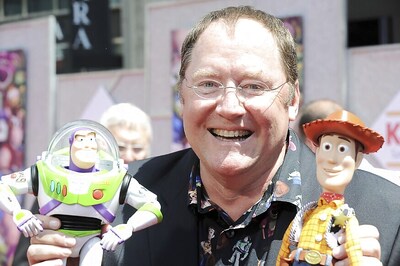
views
- New brakes and rotors come sealed in a protectant that needs to wear away after you’ve installed them. This is probably the noise you’re hearing, and it’s normal.
- If it’s raining or you’re driving through puddles, the moisture can get in between your brakes and rotors and cause that squeaking noise.
- If the squeaking is coming from 1 or 2 wheels, or if your vehicle wobbles when you accelerate, see a mechanic.
Possible Causes of the Squeaking Sound

The brakes need to be broken in. If you’ve just installed new brakes, a little squeaking is pretty normal afterwards. New brake pads and rotors are typically made out of a combination of ceramic, metallic shavings, and resin. These materials are abrasive, which makes them excellent for stopping a vehicle, but they do come covered in protectants out of the box. These protectants need to be worn down, and that squeaking noise is just the protectants wearing away. This is all by design. The noise should go away on its own, so don’t worry about it!

The brake rotors are wet. Each of your vehicle’s 4 brakes have their own braking calipers and brake pad. When you press the brakes, the caliper squeezes and presses against the pad to force the wheel to stop spinning. This process produces a ton of heat, so if your brakes are wet that steam and friction will produce a whiny, squealing noise. This is also no big deal, and the noise should go away whenever the pads dry out.

The brakes aren’t lubricated. Some brakes (but not all) require a one-time application of metal-free brake lubricant to the backing plate. If you didn’t apply this lubricant, your brakes may be making a lot more noise than they should be. If a professional installed your brakes, the only real way to know if this is the problem is if the sound doesn’t go away after a few days and your brakes feel kind of “sticky.” A lot of brakes come pre-lubricated or with a lubricated shim on the backing plate. You don’t need to worry about adding lubricant to these brakes.

The anti-noise shims were removed. If you replaced the brakes yourself, you may have missed a step depending on your brand and model. Some brakes come with small shims that fit in between the backing plate and the brake pad. These shims are designed to help dampen sound, so if you took them off your brakes may be louder than usual. This shouldn’t impact the quality or capabilities of the brakes; they’ll just make a little more noise than normal. Keep in mind, a lot of this noise is probably coming from the brakes getting broken in.

You only replaced the brake pads, but not the rotors. Normally, you want to replace the rotors and the brake pads at the same time. However, if you don’t replace the rotors, your new brake pads won’t fit the grooves in the rotors where the old pads were wearing the rotors down. As a result, you’ll hear some scraping sounds as the rotors get used to the shape of the new pads. This is also no biggie. The brakes will work fine and the squeaking should go away over time.
What to Do about the Squeaking Sound

Test the brakes to confirm they’re actually stopping your vehicle. As soon as your brakes are installed, turn the car on and confirm the pedal works. Then, idle forward slowly and test the brakes. Once you’ve confirmed the brakes actually stop the car, get up to speed on an empty road and confirm they’re working under normal conditions. So long as your brakes work, you don’t need to worry about the safety of your vehicle insofar as the noise goes. If your brakes aren’t working and you installed them yourself, contact a tow truck and have them tow your vehicle to a mechanic.

Continue driving for a few days until the sound goes away. If the squeaking is just moisture or the protectant layer wearing away, you don’t need to worry about looking into this. The sound should go away after a few trips as your brakes get worn in. If you’re lucky, the sound may even go away on your way home from the mechanic!

Take the vehicle to a mechanic if the problem persists. Whether you installed the brakes yourself or a mechanic did it for you, you’ll need to consult a pro if the squeaking noise doesn’t go away. It’s likely that your brakes are calibrated correctly or there’s something else going on. It’s really not a good idea to work on your brakes anyway, unless you really know what you’re doing. Messing up a braking system can put you at serious risk on the road.
Potential Concerns

The noise only comes from 1-2 of the brakes. If the squeaking noise isn’t coming from all of your wheels, it’s likely that one or more of the brake pads are calibrated incorrectly and they’re resting against the rotors when they shouldn’t be. If the problem is bad enough, this can lead to engine issue or problems with your transmission, so get your brakes adjusted soon.

The car starts wobbling when you accelerate. This is a sign that your brake pads aren’t installed evenly. This is worrisome if it affects your ability to operate the vehicle. Notably, this wobbling is likely to get worse when you accelerate. It’s not safe to keep driving if you don’t have full control of your car, so take it to a mechanic soon. This is almost positively the case if the squeaking noises seem to be connected to the acceleration and the noise and wobbling begin at the same time.
Reasons Old Brakes Squeak

It’s time to swap out your brakes and rotors. If you haven’t replaced your brake pads and rotors in a while, the squeaking noise is actually an indicator. Brakes are actually designed to let out a high-frequency squeal when the rotors and pads have been worn down to a particular level. Do not ignore this sound! Your vehicle needs some new brakes and rotors. You should get new brakes every 25,000–50,000 miles (40,000–80,000 km), so if it has been a few years, it’s time for new brakes.


















Comments
0 comment